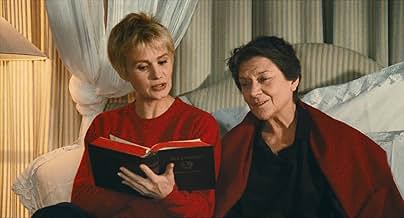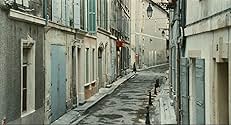PUNTUACIÓN EN IMDb
7,0/10
1,9 mil
TU PUNTUACIÓN
Una película multifacética basada en la novela de Raymond Jean "La Lectrice". Constance (Miou-Miou) lee la novela en voz alta en la cama a su amante.Una película multifacética basada en la novela de Raymond Jean "La Lectrice". Constance (Miou-Miou) lee la novela en voz alta en la cama a su amante.Una película multifacética basada en la novela de Raymond Jean "La Lectrice". Constance (Miou-Miou) lee la novela en voz alta en la cama a su amante.
- Dirección
- Guión
- Reparto principal
- Premios
- 4 premios y 8 nominaciones en total
María Casares
- La veuve du général
- (as Maria Casarès)
Reseñas destacadas
Our heroine Constance (played by Miou-Miou in yet another role where she seems to play the same character as always...herself) turns her passion for literature into an exciting and profitable "profession". Her little newspaper advertisement eventually brings her a variety of eccentric clients who take advantage of this young woman's services (literally). Hired to read to the disabled, the elderly and the bored, Constance creates, fulfills and participates in her employers' fantasies and peculiar dreams. Warned by the clerk who helped her with the initial advertisement not to be surprised if her ventures yield complications and trouble, Constance seems to not only meet the challenge, but to enjoy the sense of danger and surprise.
The degree of tolerance and acceptance of human sexuality displayed in this film may appear over-the-top to viewers unfamiliar with French culture, and French society's extremely liberal social mores. This film was produced in the 1980s, not the 60s (you'd never know it). The "anything goes" mentality is likely to perplex the average viewer, and it may even offend some. The twisted freshness and daring situations eventually seem gratuitous. We "get it" pretty early on, yet the soft-core peep show continues throughout the film. The intertwining of actual literary passages and storyline are fascinating. Unfortunately my fascination with this film ends there.
The degree of tolerance and acceptance of human sexuality displayed in this film may appear over-the-top to viewers unfamiliar with French culture, and French society's extremely liberal social mores. This film was produced in the 1980s, not the 60s (you'd never know it). The "anything goes" mentality is likely to perplex the average viewer, and it may even offend some. The twisted freshness and daring situations eventually seem gratuitous. We "get it" pretty early on, yet the soft-core peep show continues throughout the film. The intertwining of actual literary passages and storyline are fascinating. Unfortunately my fascination with this film ends there.
There's more than a little touch of Pirandello in the night about this entry in which a young woman, Constance, is not only reading a book entitled The Reader, to her husband in bed but also projects herself on to the eponymous character, Marie, and acts out either her own (Constance) fantasies or those of the fictional Marie or a combination of both. Given the task of carrying the film Miou-Miou is more than up to it and freshness is added by both the location, Arles, albeit little more than the picturesque narrow streets traversed by Marie between gigs, and the supporting cast, relatively unknown outside France though certainly well respected - especially Brigitte Catillon and Patrick Chesnais - within it. It's unquestionably a film that will divide opinion between those who will surrender to its whimsy, offbeat charm and dialogue and those who will denounce it as soft-porn with a press agent. As for me, I love Brigitte Catillon in anything.
I just rewatched this as I was converting it from my ancient cable taped vhs to dvd-r. Shinwa's comments describe this film about as well as one can in a capsule review. Or mabye I'm just becoming older and more curmudgeonly. The literary components seem like they were derived in the manner of Surrealist poetry-- chop up a bunch of sentences cut from books and magazines and pull them from a bag one at a time. Certainly there is no moral triumph taking place because Constance/Marie won't read Sade to a bunch of geezers. In fact, it's a cop-out to the "profession" she's field testing, kind of like a librarian not adding books to the collection because of personal bias. What I enjoyed most about this film is the soundtrack, and the wonderful settings. Love those old world cramped French streets and crumbling buildings with bad plumbing, which we see every time Constance goes trekking between appointments. Now if you want real French comedy, watch for Alexandre le bienheureux if it's ever released on video.
The basic virtue of this beautiful film is to preserve and use, in beautiful manner, all the flavors of the novel. The second, no doubts, Miou - Miou. But she can not be exactly surprising. A film about books and the adventures having the books as seeds. More precise, a film about freedom.
This is a slightly bizarre film, a bit like a pretentious European soft porno movie from the 1970ies, minus the sleaze. I have seen it before in a dubbed version, back when it first came out, and didn't get it -- the movie relies heavily on the original dialogue. This time I saw the French version, and, although I still can't say that I managed to penetrate into the story's every nook and cranny, I can testify that the dialogue is quite witty, the wit is farcical, and Miou-Miou is adequately sensual. And that's more than you can say for most movies these days. It won't make it into my personal list of desert island films, but I'm genuinely glad to have given it another go.
¿Sabías que...?
- CuriosidadesFrance's official submission to the 1989's Oscars in the Best Foreign Language Film category.
Selecciones populares
Inicia sesión para calificar y añadir a tu lista para recibir recomendaciones personalizadas
- How long is The Reader?Con tecnología de Alexa
Detalles
Taquilla
- Recaudación en Estados Unidos y Canadá
- 699.397 US$
- Recaudación en todo el mundo
- 699.397 US$
Contribuir a esta página
Sugerir un cambio o añadir el contenido que falta


























